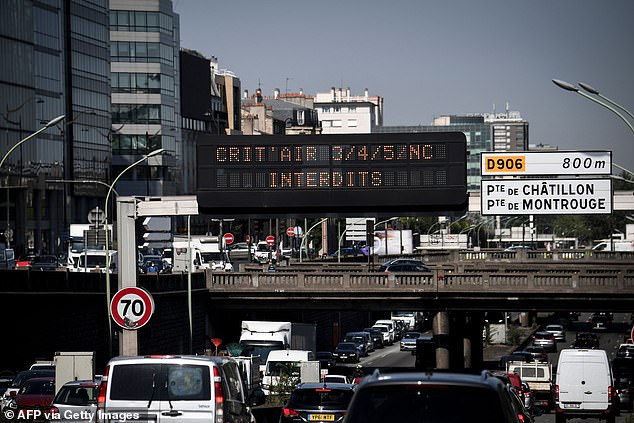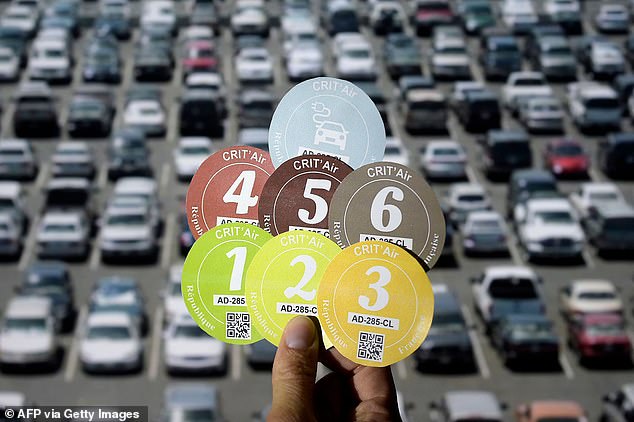France could scrap its own version of ULEZ after lawmakers decreed the scheme is ‘economic suicide’ and punishes poorer motorists.
A group of MPs from the National Rally and the Right have gathered together – along with a few independents and MPs from Emmanuel Macron‘s Renaissance group – to table the plan which is set to be voted on in the French Parliament.
Currently, local authorities whose urban areas exceed regulatory air quality thresholds are required to set up low-emission zones (ZFE), under French laws passed in 2019 and 2021.
The stated aim is to cut emissions of fine particles, which authorities say are responsible for 48,000 deaths a year in France, by excluding certain old or polluting vehicles.
Some 24 towns and cities – notably Paris and Lyon, as well as Grenoble and Montpellier – have had to introduce the laws to varying degrees, and all French cities with over 150,000 residents are supposed to implement the ZFE this year.
Since January 1, no private diesel cars before 2006 have been allowed to enter the cities. Those that do enter, must carry ‘Crit’air’ stickers that prove their low-pollution levels. Anyone who fails to comply risks being issued a fine of up to €135.
The proposal – due to be voted on in the National Assembly as part of a wider law on ‘simplifying economic life’ – would allow almost three million currently banned vehicles to enter the roads in big cities again, Le Monde reports.
Defenders of the existing system point to studies showing the low emission zones significantly reduce air pollution and respiratory disease.

Paris on the Peripherique ring road shows a digital display indicating that vehicles bearing Crit’air stickers of rank 3, 4, 5 and unclassified vehicles are not allowed to circulate (July 31, 2020)

Crit’Air stickers issued by the French ministry for ecology, sustainable development and energy to rank vehicles according to their emission of air pollutants as part of the ministry’s Air Quality Action Plan
Opponents, however, warn about the impact on poorer motorists and drivers no longer being able to use their longstanding vehicle of choice.
Half of motorists coming into ZFEs live outside the towns, meaning they are unable to qualify for certain aid or dispensations, The Telegraph reports.
An angry demonstration took place in Paris on Sunday calling for the abolition of ZFEs, amid other planned protests.
Recently, Jordan Bardella, the National Rally leader, said: ‘Accepting ZFE means accepting punitive and anti-social environmental measures.’
Laurent Wauquiez, head of the conservative Republicans Party in parliament, added they ‘lead to social anger, territorial division and economic suicide’.
It came after prime minister Francois Bayrou said in February ‘it is the poorest, those who cannot afford it, who live far away, who are the victims’.
There is a slim chance the ZFE could be scrapped, though it is more likely it will be watered down – with the result of any vote depending largely on turnout in France’s fractured parliament.
The government hopes it will persuade MPs to retain the legislation – through drafting an amendment that would only oblige Paris and Lyon to implement the zones as their pollution levels are twice above WHO recommendations.

Jordan Bardella (pictured), the National Rally leader, said: ‘Accepting ZFE means accepting punitive and anti-social environmental measures’
In other cases, town halls would decide whether to proceed.
Scrapping the entire scheme would mean the government risks having to reimburse the European Union part of the €3.3billion in funds earmarked for it this year alone.
France is due to receive €40.3billion to support its implementation.
Agnès Pannier-Runacher, the ecological transition minister, told Le Figaro newspaper: ‘Pollution is a major public-health issue. It is the most vulnerable who are impacted, those who live close to roads, especially those living in social housing.
‘ZFEs are one of the tools for reducing air pollution, particularly in large conurbations.
‘Everyone has the right to move around, but also to breathe. There is a dual objective: the health of the French people and social justice. That is what is at stake in this amendment.’
A separate initiative has seen some 35 MPs from the Right, the centrist MoDem and the independent Liot group, table another bill to be examined in parliament in the coming weeks, calling for a five-year moratorium on the scheme.
In London, figures show drivers were handed more than £322million in fines for non-payment of the ULEZ since the sceme expanded in August 2023, up to the end of June last year.
In total, nearly 1.8million penalty charge notices were issued.
Critics say high streets in outer London boroughs have also been impacted by the scheme, with spending having fallen by 3.4 per cent in the year after ULEZ expanded, compared with a 2.8 per cent fall across inner London.







